The families hitting the roads less travelled
RED dirt in every pore, driving hundreds of kilometres a day with children across the Outback. Meet the Victorians on the road to family adventure. HOW YOU CAN WIN A JAYCO MOTORHOME
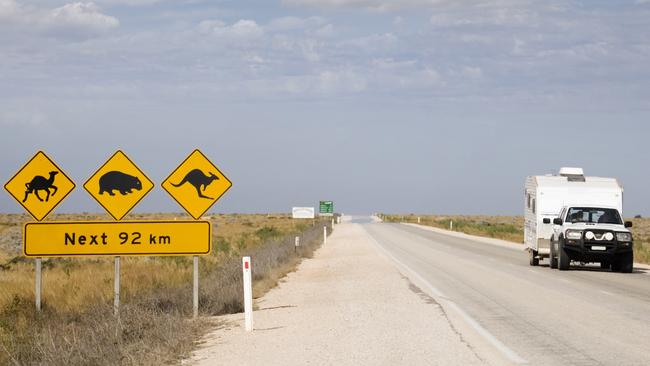
VIC News
Don't miss out on the headlines from VIC News. Followed categories will be added to My News.
FAMILY road trips. They’ve travelled a long way since Chevy Chase’s hapless dad dragged his cranky kids and worried wife across the States in the movie National Lampoon’s Vacation.
And caravanning? Well the highways are no longer solely populated with Grey Nomads indulging in a roving retirement.
Young families are pulling their kids out of school for a few weeks/a term/a year and hitting roads less travelled.
STARTS SUNDAY: WIN A JAYCO MOTORHOME
“There is certainly a trend towards mums, dads and children doing these trips,” Campervan and Motorhome Club of Australia chief executive Richard Barwick says.
Australia has 620,000 registered recreational vehicles — caravans, motorhomes and campervans. This impressive figure doesn’t include the popular camper trailer.
Barwick says that at any one time more than 135,000 RVs are on the road — and he increasingly sees an emerging market of families behind the wheel.
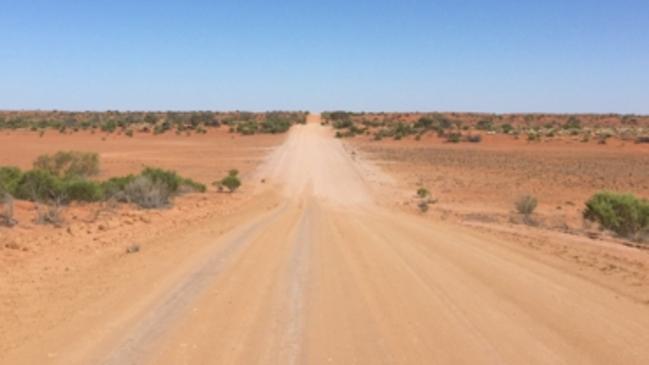
According to Tourism Research Australia, almost as many Australians aged under 55 caravan each year as Grey Nomads. Last year, those aged 30-54 spent 20.3 million nights caravanning, versus 22 million for those over 55. So it’s not just an oldies’ pastime.
“Mums and dads are re-evaluating their own lives and that of their family; they want to give their children some life skills, as opposed to a mainstream education,” Barwick says.
With overseas package deals seemingly cheaper and more accessible than ever before, what drives parents to pack up their kids and travel around this big brown land of ours?
For Melbourne mum and dad Georgie and Sam Hunt, it was about giving their brood a broad education. They took their five — yes, five — children on a six-week road trip around Australia. What were they thinking?
“We wanted to show our family incredible parts of the world that require a bit of an effort to get to,” Georgie says.
The Hunts invested in a four-wheel-drive plus camper trailer and drove Tilly, 12, Lucy, 10, Tom, 7, Clara, 4, and Fred, 3, from Darwin to Broome; a trip that took in Kakadu, Katherine Gorge, the Gibb River Road and Mitchell Falls.
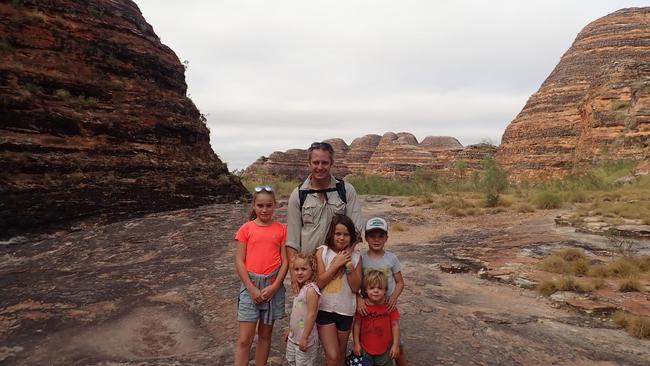
In this hyper-hygienic world where we tend to wrap kids in cotton wool, Georgie admits it was a chance for her kids to get in touch with their inner grot.
“I liked the idea of the kids roughing it a bit. Life is a bit easy for them, really,” she says. “Out there they have to learn simple things, like how to share, play in trees and be dirty.
“I also loved the idea of taking a break from the routine of life. Life gets very busy. It is hard sometimes to stop and take time out together.”
Melbourne mum of three Michelle Ayyuce fancied an Aussie road trip after a disastrous family overseas holiday — one that didn’t quite live up to the glossy brochure.
“We’d been to Singapore and Borneo and it was so darn expensive,” Ayyuce says. “Yet everyone wanted to stay in the hotel. No one wanted to get out and do anything. No one appreciated the new surroundings. No one wanted to eat any of the food and everyone
was uncomfortable.
“I spent all my time standing in queues at the airport. I thought, ‘I am done. I am never doing this again — what is the point?’ ”
Ayyuce and husband Altay bought a second-hand Jayco Expanda caravan and took Olivia, 11, Riley, 9, and Abby, 7, on a three-month journey. They drove through the centre of Australia as far as Darwin, back to Katherine, across the Kimberley, explored the west coast, headed as far south as Perth, and returned to Melbourne across the Nullarbor Plain.
“We wanted to give our children this experience. Friends of ours had done this trip and said, ‘You won’t regret it’,” Ayyuce says.
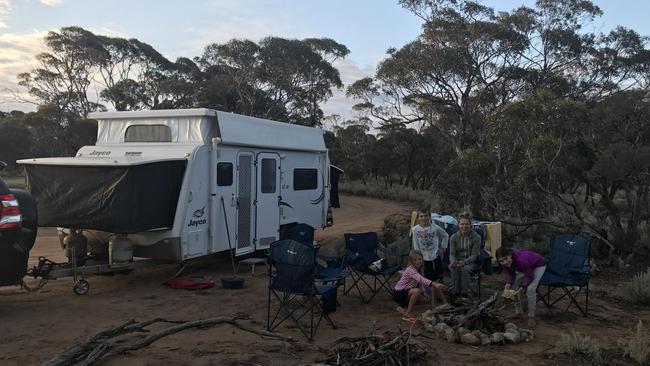
None of the families interviewed regretted their trips. For many it represented the ultimate break — yes, even the family of seven.
“It was easier than being in Melbourne with five kids,” laughs Hunt. “There was no schedule. We didn’t have to race here and there and I didn’t have to make endless school lunches.”
Not to mention a reprieve from the daily grind of washing mountains of clothes.
“That’s right. Sometimes we got a bucket out and did a hand wash. There was a very limited wardrobe for everyone — all low-key clothes that had to go into the rubbish at the end of the trip,” Hunt says. “Sometimes the shower would just be a swim in the river — crocodile-free areas, of course. Other times we stayed in official camp grounds with shower blocks.”
For this family of seven the return to simplicity also incorporated a screen-free rule. What? No iPads or smartphones?
“No. We took a few board games for night-time — chess, Scrabble, Uno. It was so special having the time every night to sit down together as a family and just talk and be together,” Hunt says, sighing at the memory of a life less complicated.
Ayyuce agrees the simplicity of life on the road is part of its appeal.
“My kids didn’t watch TV, use an iPad or phone for the whole trip and it wasn’t banned, they just didn’t ask, “ she says. “We all survived wearing shorts and a couple of changes of T-shirts. Everything gets dirty. We did washing every four to five days and would fit it around our schedule.
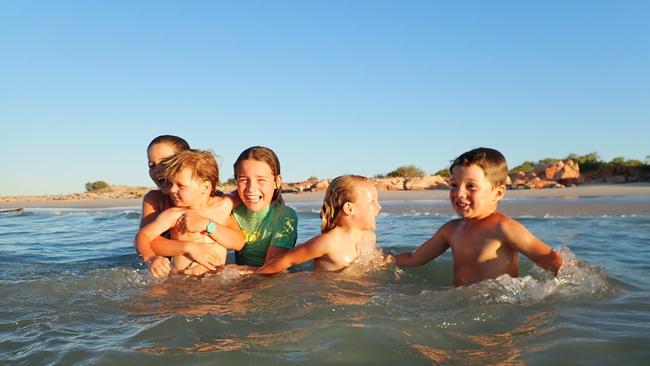
“I thought I’d get sick of going to communal areas to wash and shower but that’s where you meet people and pick up travel tips and advice.
“Besides, five people can have a shower at the same time. At home you’re always waiting for someone to get out of the bathroom. Oh, and I had three months where I didn’t have to clean a shower or a toilet.”
On the topic of practicalities, how do parents feed hungry troops on the road?
“Fresh fruit and vegetables were limited in some of the more remote areas,” Mornington Peninsula dad Andrew Nikakis says.
He and wife Georgie hitched a hybrid camper to their LandCruiser and took their daughters — Chloe, 13, Phoebe, 11, and Charlotte, 9 — on a wild and intrepid trip. The 25,000km odyssey traversed western NSW and took in everything from Mt Isa and the Gulf of Carpentaria, Arnhem Land, Fitzroy Crossing, Ningaloo Reef, the Pilbara and Uluru.
“We took two fridges. You need enough refrigeration space to store food. We grabbed fresh produce where we could. Other than that, we used frozen meat, peas and took pasta and potatoes,” Nikakis says.
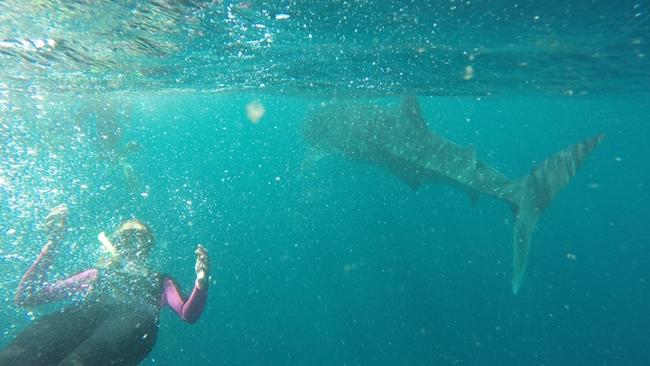
Hunt agrees that at the end of the Gibb River Road fresh food was hard to find. But generally, the family ate better than they ever had. That’s right. There’s no room for fussiness because there is no choice; kids have to eat what is put in front of them.
“When you go to the shops the kids are always nagging you for a treat. There was none of that,” Hunt says. “We took a little Weber and the camper trailer had a fridge. We’d cook a piece of meat on the barbecue and have salad or vegies.”
All of the parents say the journey itself was the highlight, one that gave their children extraordinary and unforgettable experiences. It provided them with a raw, real-life education that can be found in neither classroom nor textbook.
“It was like nothing we’ve ever seen,” Nikakis says. “We got to make spears and did spear fishing, we saw spectacular salt lakes, went swimming with whale sharks and witnessed some very remote Aboriginal communities.
“It gave my family some understanding about the way many indigenous people live and a small insight into what their lives may be like. It increased our level of understanding and empathy for them.”
Ayyuce was overwhelmed by how much her family learnt during their trip.
“The Aboriginal culture blew me away in terms of my ignorance about it; I was confronted,” Ayyuce says. “Yet the trip gave me an understanding of Australia’s geography and the beauty of this country. My three children are now more open and aware of the size of the land and what is out there.”
Life lessons aside, what about missing school and formal education? Were the parents worried their children would fall behind?
“Honestly, it was a concern initially,” Ayyuce says. “Especially our seven-year-old who should have been consolidating her reading.
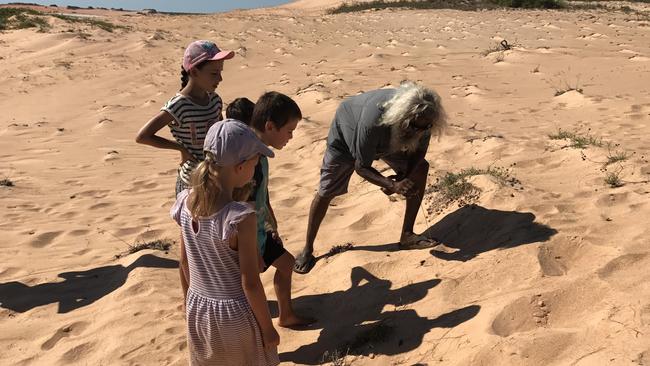
So before we left for our three-month trip we did a bit of extra tutoring.
“On the road, the teachers gave us a bit of work to do. We listened to audio books. The children kept a journal. And you know what? Our daughter’s reading jumped six months ahead of where she was.
“My oldest daughter did a speech on the leadership skills she gained while on the trip and she went on to become school captain. Our kids grew, not only academically, but as people.”
Hunt spoke with her children’s teachers before the family’s holiday.
“The teachers all said, ‘Don’t worry about it — what you miss compared to what you are learning out there in the country doesn’t matter at all’,” Hunt says. “We did some times tables, the kids read signs and maps. The oldest wrote a blog post, which was a great way for family and friends and teachers to see what we were up to.”
Life on the road presented far fewer metaphorical speed bumps and potholes than imagined. OK, so Nikakis admits the suspension on their camper broke five weeks into their trip, and again 700km west of Alice Springs. But everyone survived.
“The kids absolutely loved it. They keep asking when we can go again,” he says.
So what tips do these explorers have to share?
Unsurprisingly, given his suspension woes, Nikakis suggests top-shelf insurance.
“Get the highest level of RACV roadside assist,” he says.
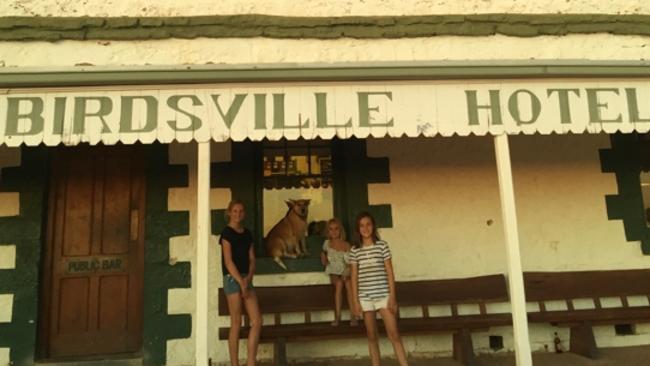
The Hunt family insists on the value of a practice run.
“We did a trial at Easter as we had never camped together as a family before,” Hunt says. “We worked out what we needed. One thing I learnt was I did not want everyone stepping all over everybody else at bed time, so we got a camper trailer where all the beds are up high.”
Ayyuce swears by an app called WikiCamps.
“It’s your bible for going anywhere. It shows you every campsite, every toilet block, every location you can visit,” she says. “It also shows you the distance to get to places. You can download the maps and it works off GPS.”
Barwick, from the Campervan and Motorhome Club, suggests you don’t buy the first RV that comes along; test them and find one that suits your needs. And question seasoned travellers before you go.
“There are plenty of online forums where you can ask questions. Nothing is too ridiculous because it could affect you on the road,” he says. “Ask things like: Is there storage under the bed? Does the kitchen suit your needs? Do you need to put driving lights on the trailer? Where do I put the TV aerial? Does the step come down automatically? Where do I dump my black water? (that’s used dunny water for the uninitiated). Without research, you’ll be back in a month.”
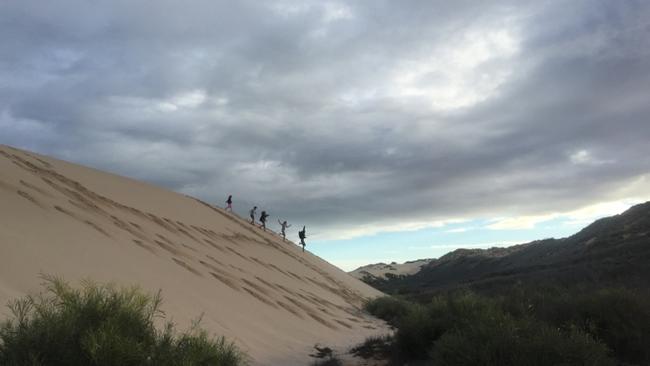
Once you’re sorted, Ayyuce says you’ll never look back.
“Seeing the stars at night time against that complete darkness, witnessing the red dust, the nothingness off the roads, the lone birds flying. It is pure escapism,” she says. “And as a family we became so much closer; you bond, you learn so much more about your children.
“We lived every day in the moment for 88 days. It was transforming.”
Originally published as The families hitting the roads less travelled


